11th Annual
REVIEW OF THE JUDICIARY
by
Senator the Honourable Fred Mitchell
Delivered under the Fig Tree, Supreme Court
Nassau, The Bahamas
Monday 8th January, 2001
PHOTOGRAPHS BY TIM AYLEN
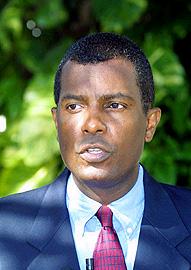
NO ACCOUNTABILITY
Permit a personal sentiment with regard to the
Judicial branch of the Government of The Bahamas. There is no or
no sufficient accountability of the Judicial Branch of the
Government to the people of The Bahamas. It means therefore that
short of a full-scale constitutional exercise to remove a judge
or magistrate from office, or the review of the jurisdiction and
actions of an inferior court, there is no way for the public to
complain about the possible abuse of a magistrate or judge or a
court official or a judge of the labour tribunals.
Some actions of officers in these courts have
bordered on abuse of discretion but litigants do not have the
money or temerity to face a procedure for judicial review or
appeal. The constitutional provision for the removal of judges or
magistrates has never been invoked and the officials are unlikely
to be moved by it.
What is required is a complaint's unit about
the actions of judges and magistrates similar to that now used by
the Royal Bahamas Police Force where matters of abuse are
believed to have been visited upon litigants and defendants
before the Courts.
In one court, there are persistent complaints
about a Magistrate not having a sufficient judicial temperament
for the job. The complaint is that in one Magistrate’s
Court, counsel and defendants are spoken to in a rude and
discourteous manner in circumstances where counsel and defendants
are courteous and deferential in the extreme to the court.
Further, it appears that the presumption of innocence is no
longer applicable in that court. In another Court, a Magistrate
has arbitrarily decided that men will not be allowed to wear
earrings in their ears, despite the fact that women are allowed
to do so. This is patently discriminatory based on gender, and
given the fact that the culture and style of the country has
significantly changed with regard to male dress and styles; such
a decision cannot be supported.
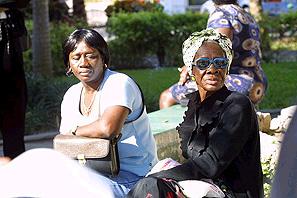 Given the
socioeconomic level at which these complaints would emanate, it
would be difficult for any of these persons to mount a
constitutional action to reverse these decisions.
Given the
socioeconomic level at which these complaints would emanate, it
would be difficult for any of these persons to mount a
constitutional action to reverse these decisions.
There is also a persistent problem in one
Magistrate’s Court with regard to the setting of excessive
bail. Many defendants find themselves routinely in that court
having to proceed to the Supreme Court to reduce excessive bail.
Again, this is a costly exercise for defendants.
A possible solution to this is to have a set of
guidelines for bail set by the Chief Justice for Magistrates and
other Judges to follow. This is similar to the power that the
Chief Justice now has since Parliament passed new legislation
last year to provide for sentencing guidelines.
For the moment, this is pointed out to the
Judicial Branch of the Government for its consideration.
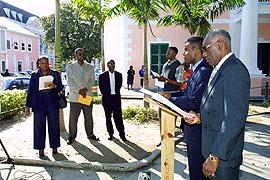 It has been
said many times during previous reviews that the Judicial branch
of the Government makes public policy. What it does affects the
lives of the citizens of this country every day. They must be
made accountable in a democratic society for their actions. The
legislature and the Cabinet ultimately have to face elections.
But the Judiciary seems to see itself as a law unto itself, with
many in the media aiding and abetting them in the argument that
their decisions are above the scrutiny of the people. That cannot
be.
It has been
said many times during previous reviews that the Judicial branch
of the Government makes public policy. What it does affects the
lives of the citizens of this country every day. They must be
made accountable in a democratic society for their actions. The
legislature and the Cabinet ultimately have to face elections.
But the Judiciary seems to see itself as a law unto itself, with
many in the media aiding and abetting them in the argument that
their decisions are above the scrutiny of the people. That cannot
be.
And in this regard, we remind the Judicial
Branch of the Government and the media of the quote from Lord
Denning that justice is not a cloistered virtue.
THE CORONER’S COURT
Nowhere was it more clear during the year of
the impact of a Court on the lives of individuals in the country
and on public policy than in the Coroner’s Court. The
Coroner is a statutory creature established in 1910 under the act
that can be found in Chapter 43 of the statute laws of the
Commonwealth of the Bahamas 1987.
We point out that the Court has been manned by
Winston Saunders since 1992, and a credible job has been done
with the work of the Coroner. The remit of the Coroner is to
investigate deaths for which there is no explanation and if
possible to make findings of fact and charge criminal offenses
where a finding of homicide is made by the jury.
The juries are made up of 7 persons who can be
press-ganged from the streets by the Court. They must be over the
age of 21 and they can be men or women. In practice many of the
jurors on Coroner’s Court juries appear on several juries
during the year, because unlike the Supreme Court there is no
list of registered voters from which to draw.
The Court has made some satisfactory decisions,
more often than not. It has brought closure to scores of families
who had no other recourse. In many cases charges have been
brought against persons in cases where the Attorney General or
the police refuse or feel unable to prosecute someone for a
homicide. It has also been useful where persons have gone missing
in circumstances where it is obvious that they are dead, but
insurance companies refuse to pay until there is a finding of
death by a competent court.
The Coroner’s Court is also responsible
for the investigation into the death of any person who dies in
custody whether in the custody of the police, in Her
Majesty’s Prison, or in the Sandilands Hospital.
The public has accepted the work of the Court.
And the Government should take note as Winston Saunders has
resigned and demitted office, largely over frustrations with the
inability to reform the Court. He has now gone back into private
practice. The Court’s usefulness is that the public now
knows that there is a place to go to when there is an unexplained
death that might bring closure to the death of their loved one.
The Government should move expeditiously
therefore to appoint someone else to fill Mr. Saunders’
position so that we do not end up with a situation similar to
that prior to 1992 when so many requests for inquests had been
made and there was no action whatsoever on those inquests. The
Government should also send a formal note of thanks to Mr.
Saunders for his efforts in organizing the work of the Court.
WHEN THE CORONER’S COURT FELL INTO ERROR
The Coroner’s Court however, was not
perfect, and two cases in particular point to the need for legal
reform of the powers of the Court and the clarification of what
the public policy ought to be on freedom of information.
The first case is that of the inquest into the
death of John Higgs. Mr. Higgs was an inmate at Her
Majesty’s Prison who died by his own hand shortly before he
was to be executed in February 2000 for murder of his wife. An
anonymous note was delivered to Radio Talk show host and
legislator Senator Obie Wilchcombe, which note purportedly was
written by the hand of Mr. Higgs explaining why he had taken the
action that he did to cheat the hangman.
Mr. Wilchcombe, not being properly summoned, to
the Court nevertheless agreed to appear and give evidence during
the inquest. In the course of his testimony, he refused to reveal
the place where the note was given to him on the grounds that as
a journalist he could not in all conscience reveal the source of
the note. He claimed that to reveal the place where he got the
note might also reveal the source.
In the event, the Court exercised a statutory
power to commit Senator Wilchcombe to Her Majesty’s prison
for four days for refusing to answer the question. The decision
was an outrage and flew in the face of the right of a journalist
to protect his source. The law of The Bahamas does not confer
such a right as such, but it is clear to this author that in the
contemporary climate of freedom of speech and the press, the
press has impliedly under our constitution a right to refuse to
answer on the grounds that the source would be revealed. In the
jurisprudence of the European Convention on Human Rights, the
freedom of expression provisions similar to our article 23 of the
Constitution provide such protection to journalists.
While journalists who are line staff supported
their colleague, the management of the press did not. The press
seemed to acquiesce in the face of the judicial branch's exercise
of authority. The argument of the Judicial branch is that in a
case where there are competing public interests, i.e. the right
under the freedom of expression provisions to protect a source on
the one hand and the right of the Court to know information that
might lead to uncover criminal activity or simply to activity
that the Court in its discretion needs to know, the Court’s
right supersedes that of the journalist.
Try as we might counsel for Senator Wilchcombe,
this Senator and Mrs. Glenys Hanna Martin could not persuade
either the Coroner, the Supreme Court or the Court of Appeal that
in Senator Wilchcombe’s case, the Court ought to defer to
the protections in a democratic society for the press. And so
Senator Wilchcombe was made to suffer the indignity of four days
in jail.
The case is instructive for a number of
reasons. First it points out the need for reform of the
Coroners’ Act. For the moment I will limit that call for
reform to the need to provide for an appeal of any decision of
the Coroner. As Counsel for Senator Wilchcombe we were stuck in
the unhappy position of having to proceed by way of judicial
review of the decision of the Coroner. This means that one can
only succeed if the Coroner made a procedural error or the
decision was manifestly unreasonable. Superior Courts are
otherwise reluctant and unable to interfere.
It is time therefore for the legislature to
intervene and to ensure that the press is able to protect its
sources in these cases.
It is an interesting irony that during the
judicial review of Senator Wilchcombe’s case, the Court
could not be persuaded that the demand of the Coroner for
information did not even meet the present test that the
information was relevant and necessary for the inquiry. As it
turns out, the assertion by Senator Wilchcombe’s attorneys
was correct. The fact is there was a razor blade found in the
cell and the jury concluded that Mr. Higgs got assistance from
inside the prison to kill himself. Senator Wilchcombe was in no
way implicated in that. So the basis upon which the Coroner
sought the information did not in fact exist at the beginning,
yet the man had to spend four days in prison. And there does not
appear to be any redress available to Senator Wilchcombe.
THE ROSLYN ASTWOOD CASE
The second case that demonstrated the need for
reform of the Coroner’s Court was that of the teacher at S.C
McPherson who was charged with manslaughter as a result of the
verdict of a Coroner’s Jury’s decision on 29 November
in the case of the death of Shawn Evans a student at the S.C.
McPherson school who was punished by six strokes of a jumbey
switch on his hand. The child later died because of an
undisclosed heart disease. The charges against Mrs. Astwood were
subsequently discontinued on 29 December by the order of the
Attorney General.
It should be said that it may still be
necessary despite the writ of nolle prosequi by the Attorney
General to have to go to court to quash the finding of the
Coroner’s Court. However, what the verdict showed is that
there need immediately to reform the Coroner’s enabling
statute to limit the kinds of verdicts that can be brought by the
Coroner’s Court.
We are aware that there has been a substantial
review of the existing legislation, having full regard for the
reforms that have been brought in the United Kingdom. Those
reform proposals are before the Attorney General and she has not
moved on them. It is time for us to move toward the position
where those reforms are put in place.
The Court should be fully established and
constituted, with a proper office, staff and budget that is
separate and apart from that of the general Judicial branch, so
that the Coroner may move about the country as it is necessary.
The reforms would enable the establishment of
such a Court. It would also see the appointment of Deputy
Coroners. It would limit the kinds of verdicts that juries can
bring. It would make it clear that juries in the Coroner's Courts
should not venture into civil findings of fact, as they have no
relevance in their inquiries. It would give the Coroner the power
to make certain recommendations to the Attorney General upon
recommendations of the Coroner or the juries. It should move the
power to charge a person but only give the power to make a
recommendation to the Attorney General. Parliament should move
expeditiously to consider these reforms. And I repeat the need to
provide for an appeal of the findings of a Coroner.
THE PRIVY COUNCIL
The Privy Council continued to be an effective
highest court of the land for The Bahamas and the other nations
of the Caribbean. Despite the nationalist talk about abolishing
the Court, largely because of the unhappiness with the strictures
put on the application of the death penalty, the court continues
to be the Court of final appeal. The Caribbean Court of Appeal is
an idea whose time has not come for The Bahamas. We share the
sentiments of Opposition Leader in Jamaica Edward Seaga that the
creation of such a Court cannot be a kangaroo court that is
simply established so that the death penalty can be carried out
quickly. A court must exist for more than that.
There is at present no official sentiment on
either political side to support a Caribbean Court of Appeal.
There is, however, continued official unhappiness with the
finding of the Privy Council this year that the Inter-American
Court of Human Rights, one of the structures of the Organization
of American States has jurisdiction to hear complaints from
citizens of the Caribbean in death penalty matters, and that
executions cannot be carried out so long as the petitions to
those structures are extant.
THE COURT OF APPEAL
The Court of Appeal appears to have been
dealing expeditiously with most applications to it. The behaviour
of judges toward Counsel has improved slightly with the passing
of the troika of Gonsalves-Sabola, Carey and George as Presidents
of the Court of Appeal. There continues to be a concern voiced by
attorneys that the Court cannot find Bahamians to sit on the
Bench. The only Bahamian on the Court, of the five justices of
appeal continues to be Burton Hall. This is a situation that
cannot continue and must be addressed by those responsible for
the nomination of judges of appeal.
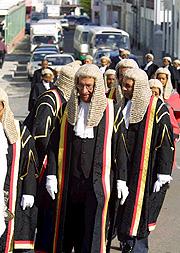
THE SUPREME COURT
The Supreme Court bench is also more than ever
increasingly relying on foreign jurists to man the benches. One
must confess also that despite years of campaigning on this issue
and the fact that there is public support for the total
Bahamianization of the bench, a majority of practitioners are
opposed to it. Their opposition increasingly comes as a result of
what many practitioners feel is a lack of intellectual acuity in
jurisprudence in the decisions of many Bahamian judges or too
often the acquiescence in their decisions to the Executive. This
reputation is probably undeserved but there is great currency to
that thinking at the Bar today. There is a feeling that Bahamian
judges do not stand up for themselves, the Bar and the Judiciary
in the face of the executive.
Nevertheless, this Bahaman remains fully
committed to the complete Bahamianization of the Judiciary.
In Freeport, there was limping justice because
for most of the year there was only one Supreme Court justice in
that city. Jeffery Lyons, an Australian, set the cat amongst the
pigeons during the year when he decided that he would not hear
any cases involving the Grand Bahama Port Authority on the
grounds of the likelihood of the appearance of bias on his part.
The Grand Bahama Port Authority assists in the
housing arrangements for Supreme Court Justices in Freeport.
Lyons J, we have been informed has since altered his position and
now takes the view that he will disclose to the parties the
interest of the Port Authority in the case, and if the parties
object he will decline to hear the case, but if not he will hear
the matters.
One supposes that this is an enormous relief to
the authorities who were privately furious at the decision and
were threatening behind closed doors mayhem and removal because
of the decision. Carrying such a decision to its logical
conclusion would have meant that many cases could not have been
heard in Freeport but would have had to have been transferred
from Freeport in order to be heard if they involved the Grand
Bahama Port Authority.
Mr. Justice Moore is moving from Nassau to
Freeport to become the second judge in Grand Bahama. Moore J will
join Lyons J on 15 January.
There is also some back channel talk about the
creation of a Supreme Court in Marsh Harbour, Abaco.
The Supreme Court did not get its own separate
budget in the annual allocations by Parliament, and the Chief
Justice still has to go to the public treasury for the use of
funds. This should be changed so that the Supreme Court becomes
independent of the treasury allocation system that often leads to
great delays in the work of Supreme Court being done.
During the year, there were several acting
appointments to the bench. There was an English trust judge
brought in for a short time. There were also three Bahamian
judges who acted, two of whom continue to act. Jon Isaacs,
formerly Chief Magistrate is now acting and so is Vera Watkins,
formerly of Magistrate’s Court Number 3 in Nassau Street.
Their appointments are for a year.
My colleague Jeannie Thompson at the private
bar also acted for three months beginning in September 2000 and
ending November. All of us should be grateful for the assistance
that she lent the Court during those three months.
We again speak to the issue of the physical
state of the courts. During the year, there was substantial
painting done to the main Supreme Court Building and a new
carpets were installed throughout, but for a substantial part of
the year, the air conditioning was not working in the Supreme
Court, making it difficult for the Courts to function.
NEW SUPREME COURT PRACTICE DIRECTIONS
The practitioners on the civil and criminal
side continued to be concerned about the question of delay. A
number of measures were taken to increase the flow of cases on
the civil side and to lessen the delay between the time a case is
charged in the criminal courts and the time of trail.
Unfortunately, persons are still waiting up to
four years for criminal trials to take place in the Supreme
Court.
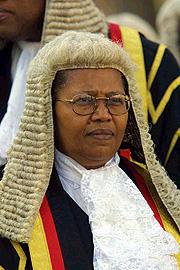 Further, the
measures put in place by the Chief Justice to improve the case
flow were uneven in their application and in their effects. They
often were so bureaucratic that they became a more tangled weave
than the one it was meant to unravel. The more sensible practice
direction was the one that created a Judge to hear quick chamber
applications at short notice. The other practice direction about
the setting down of cases needs to be revisited because it has
created more problems that it has solved.
Further, the
measures put in place by the Chief Justice to improve the case
flow were uneven in their application and in their effects. They
often were so bureaucratic that they became a more tangled weave
than the one it was meant to unravel. The more sensible practice
direction was the one that created a Judge to hear quick chamber
applications at short notice. The other practice direction about
the setting down of cases needs to be revisited because it has
created more problems that it has solved.
Further, it seemed most unusual for a practice
direction to be issued that reminded Magistrates of what the law
is. Since it would seem to logical reasoning, that if a
magistrate is a magistrate then that magistrate ought to know the
law. Clearly, this was a matter that should have been dealt with
in a series of in-house meetings with Magistrates.
EXPLANATION ON FOREIGN VISITS
During the year, two visits were announced from
Britain of leading jurists from that country. One visit was by
the Lord Chief Justice Lord Woolff on the question of case flow
management and legal reforms to ensure the efficiency of justice.
No explanation was given as to who paid for these visits and how
they came about and what was accomplished by the visits. While
useful to hear what others are doing, it would seem that the
reforms that are necessary are so obvious that one does not need
help from the outside to see that the tasks are done.
A second visit is occurring as we speak and the
same question must apply to this visit by Lord Millett as we
asked in the first visit.
THE MAGISTRATES COURT
Once again the Magistrates Court is where the
nuts and bolts of Bahamian justice can be found. Most drug cases
are settled there, and during the year Parliament gave
Magistrates increased powers. Since these courts more often than
not tend to be executive oriented in their decision-making, it
begs the question of a need for a training school for all
Magistrates and Judges of the Supreme Court before their
appointments.
This should help in the sensitivity and
judicial temperament and rehearse the procedures in Magistrates
Courts. Further, we must sensitize the court to the views of
advocates about how their courts are run.
On the civil side, the Magistrates should now
have an increase in their jurisdiction from $5000, the present
limit, to $10,000. This would be more in line with the present
economic realities. Ten thousand dollars is still a small claim
in today’s market.
There is a new Magistrate brought in from
Trinidad to replace Vera Watkins in Court Number 3 in Nassau
Street. This is the third foreign Magistrate. She joins Crawford
McKee, a Scottish Magistrate who is in Court 13 who is soon to be
transferred interestingly enough to Marsh Harbour, Abaco. The
other is Corlita Bethel who continues to man the drug court and
is now the Acting Chief Magistrate.
SECURITY CONCERNS OF MAGISTRATES
As the war on drugs heats up, and as more and
more revenue flows throughout the Magistrates Courts, magistrates
and their staffs are increasingly concerned about security at the
Courts. The security is inadequate and slack. There needs to be
attention paid to the question of security of magistrates.
On the whole, however, we wish to thank
Magistrates, especially those long suffering souls who man the
domestic courts for their assistance in dispensing justice during
the year in difficult circumstances. Our pledge is that in
another forum should the country provide the opportunity within
the next year, to work for an improvement in the terms and
conditions of Magistrates.
THE LABOUR TRIBUNALS
Throughout the year The Bahamas Industrial
Tribunal continued to do its work efficiently and well. At the
end of the year, however practitioners were concerned about some
strange rulings in one of the Courts that seemed to fly in the
face of normal judicial practice. Some litigants were complaining
that decisions were not being given in a judicial manner, and
were leading to unnecessary appeals. Some also argued that they
were not being given a chance to be heard. We thank President
Harry Lockhart and Vice Presidents Nathaniel Dean and Kelphine
Cunningham for their work during the year.
Mrs. Kelphine Cunningham served during the year
for half a year in Freeport as a Vice President of the Tribunal
and she moved cases expeditiously. She returned to Nassau at the
end of the year and the court was unmanned. Fortunately, she has
been persuaded to return to Freeport for another six months. This
will avoid a serious backlog of cases in Grand Bahama.
The Industrial Tribunal, however, is widely
accepted by the Unions as a useful body to resolve disputes.
There was some unhappiness about the ruling of the Court of
Appeal during the year about the lack of authority or power of
the Tribunal to conclude bargaining agreements where parties are
being deliberately recalcitrant. This ruling arose out of a case
appealed by the Government. And in one of the ironies of public
policy we have the Government appealing rulings of a Tribunal
that it said that it would respect. The Government has been the
main offender in taking technical objections to preventing
decisions of the Tribunal to be enforced.
The case of Phiora Clarke is a judgement of the
Tribunal that remains un-enforced and perhaps unenforceable
because the Hotel Corporation simply refuses to pay the judgement
of the Tribunal.
The Unions are also unhappy about the lack of
enforceability of the court's rulings. Further, it appears that
employers often abuse the system by filing plainly hopeless
appeals in the hope that it frustrates employees who do not have
the money to pursue a protracted appeal. There is therefore a
need for reform of the Tribunals and reform was promised.
However, no one was quite prepared for, nor had the Unions or the
employers asked for the replacement of the Court in a
comprehensive set of legislative proposals put forward by the
Government and now before Parliament. The future of the Court and
its status and jurisdiction were therefore put in doubt by these
actions of Parliament and the Cabinet during the year.
One must also point out that the physical plant
of the Tribunal is nothing short of disgraceful. There is a need
to cause substantial repairs in the facilities in Nassau, and a
major redesign of the facilities of the court. They are
inadequate and tend to show contempt for the Tribunal, its work
and the people that it serves.
THE BAR ASSOCIATION
The Bar held a number of seminars and social
events that were useful for practitioners. The difficulty
remains, however, that a major allegation was made against
attorneys by the Prime Minister. During debate in Parliament on
the recent package of drug and financial bills, the Prime
Minister was asked whether or not he had consulted with the
sectors that were to be regulated. He made an allegation that
lawyers were crooks. No word from the Bar has been heard
defending the profession.
ATTORNEY GENERAL’S OFFICE
The U.S. government made an unprecedented
assault through its embassy on the A.G.’s office. That
Government was concerned about the slow pace of mutual legal
assistance requests on drug matters and money laundering. The
U.S. Ambassador made unsubstantiated allegations of the
corruption of juries in The Bahamas. The Government did nothing
to defend the judiciary or the lawyers in the office of the A.G.
The complaint about the requests, however, exposes the continued
complaint that the staffing of the A.G.’s office is not
adequate to the task. Pay and working conditions have affected
morale. There have been several resignations. The criticism is
that the Attorney General herself does not spend enough time and
give sufficient effort to her work at the office. This is an
office that will have a critical role to play with the new
legislation in the area of drugs and money laundering that was
passed by Parliament in December.
A FINAL WORD ON THE COURTS
The media was greatly exercised about events on
29 November 2000. On that day, thousands of teachers withdrew
their labour and appeared at the Coroner’s Court to show
solidarity with their friend and sister Rosalyn Astwood who
ultimately faced a charge of manslaughter. The media condemned
the teachers for their actions on the ground that the action
seemed calculated to influence the Court. While that was not the
intention of the teachers, it begs the question so what if it
were true. And I say in this regard my personal view, which is
that this country is a democracy. We believe in freedom of
expression, and there is nothing wrong with trying to influence
any of our democratic institutions including the courts. I again
remind the press of their responsibility in this regard. The
Courts must be accountable to the public. They are not
sacrosanct, and as Lord Denning said "justice is not a
cloistered virtue."
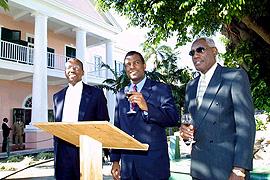 We have seen
both in the United Kingdom and in the U.S. how demonstrations are
routinely held when Courts are making important decisions. There
is nothing wrong with that. The public should have their say.
Just as judges will have their say, ultimately every decision of
the Courts must stand the test of public opinion and acceptance.
We have seen
both in the United Kingdom and in the U.S. how demonstrations are
routinely held when Courts are making important decisions. There
is nothing wrong with that. The public should have their say.
Just as judges will have their say, ultimately every decision of
the Courts must stand the test of public opinion and acceptance.
We trust that all of us will continue to
remember that a vigorous democracy requires the participation of
its citizens in the process. The teachers therefore did nothing
wrong at all.
And now I wish to do our traditional sherry
toast to justice and the judicial year.
Thank you very much indeed.


 Further, the
measures put in place by the Chief Justice to improve the case
flow were uneven in their application and in their effects. They
often were so bureaucratic that they became a more tangled weave
than the one it was meant to unravel. The more sensible practice
direction was the one that created a Judge to hear quick chamber
applications at short notice. The other practice direction about
the setting down of cases needs to be revisited because it has
created more problems that it has solved.
Further, the
measures put in place by the Chief Justice to improve the case
flow were uneven in their application and in their effects. They
often were so bureaucratic that they became a more tangled weave
than the one it was meant to unravel. The more sensible practice
direction was the one that created a Judge to hear quick chamber
applications at short notice. The other practice direction about
the setting down of cases needs to be revisited because it has
created more problems that it has solved.